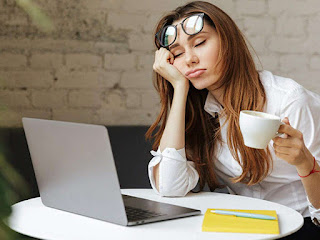In a perfect world, you would get at least seven hours of sleep
each night and stay active and attentive during the day.
Some people sleep for long
periods of time but have problems falling asleep. Others can't get a good
night's sleep due to a breathing problem like sleep apnea.
Sleepiness during the day can
affect your job, emotions, energy, and general health. Sleep deprivation raises
the risk of significant health issues such high blood pressure, diabetes,
stroke, and heart disease. In a nutshell, sleep is critical.
When should you contact a sleep specialist if you sense you aren't getting enough sleep?
Signs for concern
Although a decrease in energy
before or after meals is acceptable, excessive sleepiness is not. It's a good
idea to have a sleep evaluation if tiredness interferes with your job or any
other daytime activities, and if you're an adult who gets less than seven hours
of sleep every night despite being able to go to bed on time.
The following are indicators of
a possible sleep disturbance:
·
Unintentional dozing off
·
Have difficulties concentrating or remembering things?
·
Experiencing troubles falling or staying asleep?
·
Breathing loudly
·
During sleep, you may kick your legs
·
Suffering from a depressive disorder
You should consider going to a sleep clinic if you've been diagnosed with high blood pressure, diabetes, a
heart problem, or a lung ailment like chronic obstructive pulmonary disease
(COPD).
Follow these guidelines to plan and prepare for a restful night's sleep:
1.
Make an effort to stick to a sleep routine
When you go to bed and wake up at the same time every day, your body develops to expect sleeping at that time. You might eventually settle into a routine that allows you to sleep more comfortably.
2.
Mind your lifestyle habits
Taking care of yourself during
the day will help you sleep better at night. Consider the items you eat. When
caffeine is used too close to bedtime, it might make you uneasy.
If you exercise at the correct
time, it can help you fall asleep faster and sleep better. Exercise causes the
body to produce the stress hormone cortisol, which aids in the activation of
the brain's alerting mechanism. Unless you're attempting to sleep, this is
alright.
Religious rituals can be extremely beneficial to one's health. The study discovered that those who felt more certain in experiencing church online, slept better. It also demonstrated that religion can help people cope better with stressful events and chronic ailments, allowing them to sleep better than non-religious people.
3.
Keep track of your sleep
Write down any concerns you
have regarding your sleep. Include all and everything about your normal habits
and routine so that the doctor can see it.
Make a note of how much sleep you get each night, how long it takes you to fall asleep, whether you nap during the day, and anything else you believe is relevant to your sleep.
Takeaway
Sleep comes naturally to some people, just like blinking or breathing. Others find that getting adequate good sleep is a serious struggle that necessitates lifestyle adjustments or medical assistance. If you're having trouble sleeping, speak with your doctor about a cure.





